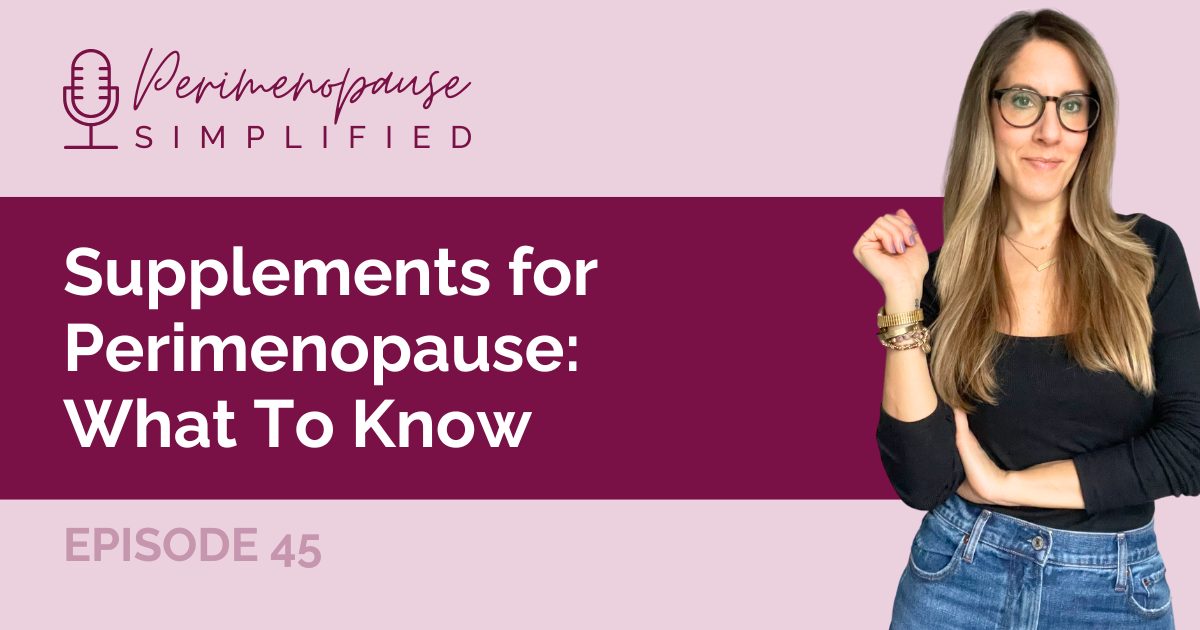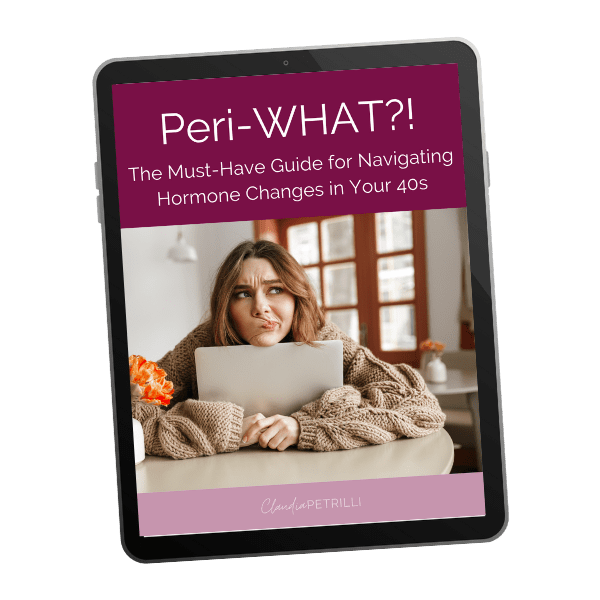
45. Supplements for Perimenopause: What To Know
Don’t Miss An Episode!
In this episode, we covered:
- Lack of quality control in supplements
- Why “natural” isn’t necessarily harmless
- Not everyone needs to take vitamin D
- How to find quality supplements
- Why testing is better than guessing
- Supplements to consider in perimenopause
Hey, welcome back to Perimenopause Simplified! Today, I’m diving into a hot topic: supplements for perimenopausal women. But before we get into the nitty-gritty, I want to start by sharing my philosophy about supplements.
My Philosophy on Supplements
I’m a firm believer in testing to determine what your body actually needs. We are all unique, and what works wonders for one woman might not be helpful—and could even be harmful—for another. That’s why testing and understanding your bioindividual needs is essential.
Not All Supplements Are Created Equal
Let’s start by addressing the elephant in the room: not all supplements are created equal. There are some downsides to consider:
Lack of Quality Control
Many supplements on the market are poorly regulated, meaning you can’t always be sure what you’re getting. Some might contain fillers, allergens, or even contaminants. This is why it’s so important to look for third-party testing and certifications, which I’ll touch on in a bit.
The Myth That “Natural” Equals Safe
Just because something is labeled as “natural” doesn’t mean it’s harmless. Supplements can have powerful effects on the body, and if used incorrectly, they may do more harm than good.
The Truth About Vitamin D
Take vitamin D, for instance. It’s one of the most commonly recommended supplements that I see big-name doctors recommending and, of course, selling. But did you know that taking it without the right cofactors, like vitamin K2 and magnesium, can cause problems?
- Excess vitamin D can contribute to something called a “calcium shell,” where calcium builds up in your tissues and disrupts cellular function.
- Vitamin K2 ensures that calcium is directed to your bones and teeth rather than building up in soft tissues like arteries or joints.
- Magnesium helps activate vitamin D.
- Ranges for vitamin D are wide, and higher isn’t always better! Ideally, we want levels in the range of 40–60 ng/mL, but this can vary based on individual factors. For instance, I live in NJ. We have long winters with little to no sun – although today is beautiful. But I won’t be laying out in this frigid weather, so I’ll only get sunlight in my eyes which is helpful, but may not get my Vitamin D levels that high and that’s OK. In the winter months, if my level is low, like under 40, I may supplement with a combo, but I also ensure my magnesium is on point and I test my HTMA several times per year to keep an eye on my minerals across the board.
Tips for Finding High-Quality Supplements
If you’re going to use supplements, quality is key. Here are some tips to ensure you’re choosing trustworthy products:
- Third-Party Testing:
Look for seals from organizations like NSF International, ConsumerLab, or the United States Pharmacopeia (USP). These indicate that the product has been independently tested for quality and purity. - They should have high standards as a company and their suppliers and follow cGMP (current Good Manufacturing Practices).
- They should test for potency, contaminants, heavy metals, allergens, pesticides, and other agents.
- Source organically grown ingredients when possible, and if not, non-GMO (genetically modified organisms).
- Transparent Sourcing:
Reputable brands should provide detailed information about where their ingredients come from and how they’re manufactured. If they don’t share it, it’s sort of a red flag. - Avoid Unnecessary Additives: Steer clear of products with artificial colors, fillers, or other unnecessary ingredients.
How Testing Guides Supplement Recommendations
In my functional health coaching practice, we rely on testing to guide supplement recommendations. Here’s what we use:
- HTMA (Hair Tissue Mineral Analysis): This provides insights into mineral imbalances and heavy metal toxicity, which are critical for overall health, especially in perimenopause when symptoms arise.
- Bloodwork: Bloodwork is my favorite thing to look at—it’s the gold standard and can give so much insight into your health when reviewed from a functional health lens.
- GI-MAP Testing: This test helps us understand gut health, which is foundational for nutrient absorption, hormone production, metabolism, and overall health.
Testing allows us to pinpoint what your body needs—and avoid giving you something it doesn’t.
Common Supplements for Perimenopause
All that said, while personalized recommendations are best, there are a handful of supplements that many women in perimenopause may benefit from:
- Electrolytes: These can help replenish essential minerals like sodium and potassium, especially if you’re dealing with fatigue or achiness. I like Cure Hydration – I’ll link to that in the show notes with a coupon code.
- Magnesium: most of us are deficient in this, some medications, caffeine, alcohol, and stress deplete it. I personally like powdered magnesium like Seeking Health or a topical form in a cream or spray for optimal absorption.
- Prebiotic Fiber Supplements: These support gut health by feeding beneficial bacteria. One to check out is Sunfiber.
- Digestive Bitters: They are gentle, taste pretty good and can improve digestion to help your body absorb nutrients more effectively.
- Spore-Based Probiotics: Most probiotic strains don’t survive in your digestive tract, plus the strains may not be right for you, and too many people take the same one for YEARS which can cause an imbalance of bacteria. We do recommend probiotics to clients, but typically after we’ve done a targeted gut protocol. That said, one I love is Megasporebiotic by Microbiome labs, because the company is top notch and the strains survive without the need for refrigeration.
- B-Complex: Many women are depleted of b vitamins -not just B12, which is the only one doctors seem to focus on. There are many b vitamins, all with different benefits. Just make sure it’s a quality brand with folate, not folic acid, for better absorption and effectiveness.
- Fish Oil: High dose is typically what’s needed and will move the needle especially for inflammation, but it takes time. Look for products that have been tested for heavy metals and contain high levels of EPA and DHA.
- CoQ10: Especially important if you’re on a statin, which unfortunately, many women are on. Statins deplete CoQ10 and it’s needed to support energy production and cardiovascular health. I could go on a rant about statins and cholesterol, but I’ll leave that for another episode.
- Amino acids: these can be incredibly helpful, especially for mental health. Ideally we’d get them via animal protein, but sometimes it’s not enough. One in particular I like is Taurine – this amino acid can be great for mood, sleep, and reducing anxiety.
The Foundations of Health Come First
Remember, supplements are just that—supplemental to a healthy diet and lifestyle. They aren’t a replacement for the foundations of health, like eating nutrient-dense foods, getting quality sleep, daily movement, proper hydration, and managing your stress.
Need Help with Supplements?
If you’re unsure where to start or want personalized guidance, we’d love to help you. Apply to work with us, or if you just want my feedback on what you’re currently taking, grab a Perimenopause Audit.
Want a deep dive? Apply to work with her HERE and start in January! The Hormone Rescue is getting some updates, including a new name: The Perimenopause Method. Be on the lookout for special bonuses!
Thanks for tuning in today! If you found this episode helpful, please share it with a friend and leave a review. It’s super helpful so more women can find me. Until next time…
Links mentioned:
Cure Hydration (code: healthcoachclaudia)
Microbiome Labs Megasporebiotic (code: claudia123)
Microbiome Labs Fish Oil (code: claudia123)
Sources:
Subclinical Magnesium Deficiency
Synergistic Interplay of Vitamin D and K
Treatment With a Spore-Based Probiotic
Taurine: A Very Essential Amino Acid
Claudia Petrilli is a Functional Health Coach, Integrative Nutrition Coach, Women’s Health Educator, and creator of The Hormone Rescue program. Having experienced debilitating periods, digestive issues, a sluggish thyroid, a pituitary tumor, and perimenopause symptoms in her late 30s, she knows exactly what it’s like to get dismissed by doctors and spend years searching for answers.
NEW COURSE:
Free Resources:
Peri-What?! The Must-Have Guide for Navigating Hormone Changes in Your 40s
Programs:
Connect with Claudia:
Have a question or episode topic suggestion? Please email: claudia@claudiapetrilli.com.
Love the show? Please subscribe, leave a 5-star rating, review, and share with others, so more women can find this podcast for guidance and support through their perimenopause journey!






